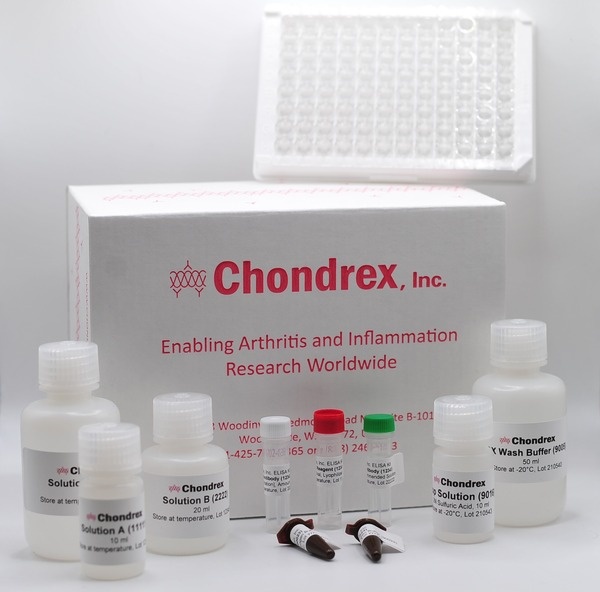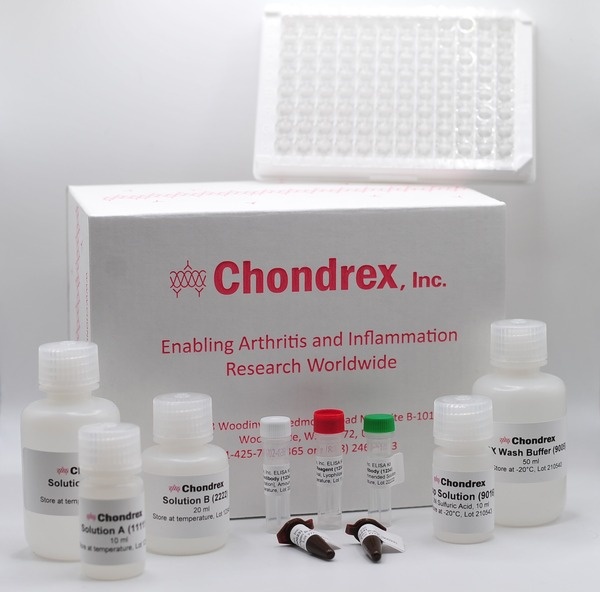Environmental factors, especially mucosal microbiota and their toxins, have been linked to the development of autoimmune diseases such as rheumatoid arthritis (1-7), inflammatory bowel diseases (8, 9), systemic lupus erythematosus (SLE) (10), and other chronic disorders (11-13). Furthermore, increases in mucosal permeability, caused by stress, surgery, and minor gastrointestinal disorders, can lead to compositional changes in the mucosal microbiota (termed mucosal dysbiosis or microbial imbalance). These compositional changes at the mucosal surfaces can lead to excess translocation of bacteria into the body, where their presence is associated with inflammation (16-18). The importance of mucosal bacteria in the pathology of autoimmune diseases has begun to be elucidated through numerous animal studies, namely:
- In models of human ankylosing spondylitis, germ-free mice fail to develop spontaneous ankylosing enthesopathy (15).
- Oral administration of Escherichia coli-lipopolysaccharide (E. coli-LPS) induces mild arthritis in mice with chronically activated immune systems (3).
- In the mouse collagen antibody-induced arthritis (CAIA) model, administration of sub-arthritogenic levels of type II collagen auto-antibodies followed by E. coli-LPS administration triggers more severe arthritis than with administration of the collagen auto-antibodies alone (19).
Of particular interest are Staphylococcal enterotoxins (SEs), proteins produced by Staphylococcal bacterium such as Staphylococcal aureus (S. aureus). Through work with various animal models, SEs have been linked with the pathogenesis of a variety of autoimmune-related diseases (21) such as atopic dermatitis (20, 22), food allergies (23, 24), colitis (25, 26), arthritis (23, 27-29), and SLE (23, 30). SEs are potent immune stimulators, known as superantigens, for their ability to bind MHC II molecules on dendritic cells and stimulate polyclonal activation of T cells and other inflammatory cells. Additionally, SEs are incredibly stable meaning that they retain their pathological activity even after being submitted to sterilization techniques (i.e. cooking) and digestive proteases. Among the SEs, staphylococcal enterotoxin A (SEA) and B (SEB) are toxins which are confirmed to cause enteritis.
In order to elucidate the pathological roles of potential environmental pathogens in inflammatory diseases, Chondrex, Inc. provides the ELISA kits for determining the antibody titers in mice and humans against E. coli (O111:B4), E. coli-LPS (O111:B4), S. aureus, SEA, and SEB. Furthermore, Chondrex, Inc. also manufactures SEA and SEB Detection ELISA Kits for detecting protein levels in liquid samples. Please refer to the respective assay protocols for more detailed information. While these antibody ELISA kits against environmental factors are useful as immune function evaluation tools, several considerations must be addressed before establishing study protocols. Here we would like to share these considerations to help users better choose kits and interpret results.
Mouse - Anti-E. coli Antibody Assays (New and Improved!)
| Product | Catalog # | Price (USD) | |
|---|---|---|---|
 |
Mouse Anti-E. Coli IgG Antibody Assay Kit | 6206 | 399.00 |
 |
Mouse Anti-E. coli IgG1 Antibody Assay Kit | 6207 | 399.00 |
 |
Mouse Anti-E. coli IgG2a Antibody Assay Kit | 6210 | 399.00 |
 |
Mouse Anti-E. coli IgG2b Antibody Assay Kit | 6211 | 399.00 |
 |
Mouse Anti-E. coli IgG3 Antibody Assay Kit | 6212 | 399.00 |
 |
Mouse Anti-E. coli IgM Antibody Assay Kit | 6209 | 399.00 |
Mouse - Anti-LPS Antibody Assays (New and improved!)
| Product | Catalog # | Price (USD) | |
|---|---|---|---|
 |
Mouse Anti-E. coli LPS IgG Antibody Assay Kit | 6106 | 399.00 |
 |
Mouse Anti-E. coli LPS IgG1 Antibody Assay Kit | 6107 | 399.00 |
 |
Mouse Anti-E. coli LPS IgG2a Antibody Assay Kit | 6110 | 399.00 |
 |
Mouse Anti-E. coli LPS IgG2b Antibody Assay Kit | 6111 | 399.00 |
 |
Mouse Anti-E. coli LPS IgG3 Antibody Assay Kit | 6112 | 399.00 |
Mouse - Anti-P. gingivalis Antibody Assays
| Product | Catalog # | Price (USD) | |
|---|---|---|---|
 |
Mouse Anti-P. gingivalis IgG Antibody Assay Kit | 6225 | 399.00 |
 |
Mouse Anti-P. gingivalis IgG3 Antibody Assay Kit | 6227 | 399.00 |
 |
Mouse Anti-P. gingivalis IgM Antibody Assay Kit | 6226 | 399.00 |
Mouse - Anti-PG-LPS Antibody Assays
| Product | Catalog # | Price (USD) | |
|---|---|---|---|
 |
Mouse Anti-PG-LPS IgG Antibody Assay Kit | 6222 | 399.00 |
 |
Mouse Anti-PG-LPS IgG3 Antibody Assay Kit | 6224 | 399.00 |
 |
Mouse Anti-PG-LPS IgM Antibody Assay Kit | 6223 | 399.00 |
Mouse - Anti-Staphylococcal Enterotoxin A (SEA) Antibody Assays
Mouse - Anti-Staphylococcal Enterotoxin B (SEB) Antibody Assays

Pathogenic Environmental Factors and the Possible Contribution to Autoimmune Diseases
Various factors can disrupt the mucosal barrier function (a). As a result, pathogenic intestinal
bacterial components (mimic antigens) and their toxins can cross the mucosal barrier into
the surrounding tissues and circulation, thus disrupting the immune homeostasis (b).
References
- Aoki S, Y.K., Yokoyama T, Nonogaki T, Iwasaki S, Mitsui T, Niwa S. Role of enteric bacteria in the pathogenesis of rheumatoid arthritis: evidence for antibodies to enterobacterial common antigens in rheumatoid sera and synovial fluids. Ann Rheum Dis, 1996. 55:363-9.
- van der Heijden IM, W.B., Tchetverikov I, Schrijver IA, Schouls LM, Hazenberg MP, Breedveld FC, Tak PP. Presence of bacterial DNA and bacterial peptidoglycans in joints of patients with rheumatoid arthritis and other arthritides. Arthritis Rheum, 2000. 43:593-8.
- Terato K, Y.X., Miyahara H, Cremer MA, Griffiths MM. Induction of chronic autoimmune arthritis in DBA/1 mice by oral administration of type II collagen and E.coli LPS. Br J Rheum, 1996. 35:828-838.
- Peltonen R, N.M., Helve T, Hänninen O, Toivanen P, Eerola E. Faecal microbial flora and disease activity in rheumatoid arthritis during a vegan diet. Br J Rheumatol, 1997. 36:64-8.
- Toivanen, P. Normal intestinal microbiota in the aetiopathogenesis of rheumatoid arthritis. Ann Rheum Dis, 2003. 62:807-11.
- Vaahtovuo J, M.E., Korkeamäki M, Luukkainen R, Toivanen P. Fecal microbiota in early rheumatoid arthritis. J Rheumatol, 2008. 35:1500-5.
- Edwards, C. Commensal gut bacteria and the etiopathogenesis of rheumatoid arthritis. J Rheum, 2008. 35:1477-78.
- Dayna Shi, Das, G., Das, J. Inflammatory bowel disease requires the interplay between innate and adaptive immune signals. Cell Research, 2006. 16:70-74.
- Nell S, S.S., Josenhans C. The impact of the microbiota on the pathogenesis of IBD: lessons from mouse infection models. Nat Rev Microbiol, 2010. 8:564-77.
- Cavallo T, G.N. Bacterial lipopolysaccharide induces long-lasting IgA deficiency concurrently with features of polyclonal B cell activation in normal and in lupus-prone mice. Clin Exp Immunol, 1991. 84:134-138.
- Penhale WJ, Y.P. The influence of the normal microbial flora on the susceptibility of rats to experimental autoimmune thyroiditis. Clin Exp Immunol, 1988. 72:288-92.
- Murakami M, T.T., Shinkura R, Nisitani S, Okamoto M, Yoshioka H, Usui T, Miyawaki S, Honjo T. Oral administration of lipopolysaccharides activates B-1 cells in the peritoneal cavity and lamina propria of the gut and induces autoimmune symptoms in an autoantibody transgenic mouse. J Exp Med, 1994. 180:111-21.
- Nymark M, P.P., Tuomainen AM, Forsblom C, Groop PH, Lehto M; FinnDiane Study Group. Serum lipopolysaccharide activity is associated with the progression of kidney disease in finnish patients with type 1 diabetes. Diabetes Care, 2009. 32:1689-93.
- Taurog JD, R.J., Croft JT, Simmons WA, Zhou M, Fernández-Sueiro JL, Balish E, Hammer RE. The germfree state prevents development of gut and joint inflammatory disease in HLA-B27 transgenic rats. J Exp Med, 1994. 180:2359-64.
- Reháková Z, C.J., Stĕpαnková R, Sinkora J, Louzecká A, Ivanyi P, Weinreich S. Germ-free mice do not develop ankylosing enthesopathy, a spontaneous joint disease. Hum Immunol, 2000 61:555-8.
- Anderlik P, S.I., Bános Z, Barna Z. Bacterial translocation after cold stress in young and old mice. Acta Microbiol Hung, 1990. 37:289-94.
- Velin AK, E.A., Braaf Y, Wallon C, Söderholm JD. Increased antigen and bacterial uptake in follicle associated epithelium induced by chronic psychological stress in rats. Gut, 2004. 53:494-500.
- Khalif IL. et al. Alterations in the colonic flora and intestinal permeability and evidence of immune activation in chronic constipation. Dig Liver Dis, 2005. 37:838-49.
- Terato K, H.D., Griffiths MM, Hasty DL, Ye XJ, Cremer MA, Seyer JM. Collagen-induced arthritis in mice: synergistic effect of E.coli lipopolysaccharide bypasses epitope specificity in the induction of arthritis with monoclonal antibodies to type II collagen. Autoimmunity, 1995. 22:137-147.
- Kamada, N., Seo, S.U., Chen, G.Y., Núñez, G. Role of the gut microbiota in immunity and inflammatory disease. Nat Rev Immunol, 2013. 13:321-335.
- Li, J., Yang, J., Lu, Y., Wu, S., Wang, M. Possible Role of Staphylococcal Enterotoxin B in the Pathogenesis of Autoimmune Diseases. Viral Immunol, 2015. 28:354-359.
- Hong, S.W., Kim, M.R., Lee, E.Y., Kim, J.H., Kim, Y.S., et al. Extracellular vesicles derived from Staphylococcus aureus induce atopic dermatitis-like skin inflammation. Allergy, 2011. 66:351-359.
- Baharav, E., Gur, H., Fishman, P., Ziporen, L., Blank, M., et al. Superantigens and experimental SLE induced by idiotypic dysregulation. Clin Exp Rheumatol, 1996. 14:359-366.
- Ganeshan, K., Neilsen, C., Hadsaitong, A., Schleimer, R., Luo, X., Bryce, P.J. Impairing oral tolerance promotes allergy and anaphylaxis: a new murine food allergy model. J Allergy Clin Immunol, 2009. 123:231-238 e234.
- Yang, P.C., Wang, C.S., An, Z.Y. A murine model of ulcerative colitis: induced with sinusitis-derived superantigen and food allergen. BMC Gastroenterol, 2005. 5:6.
- Lu, J., Wang, A., Ansari, S., Hershberg, R.M., McKay, D.M. Colonic bacterial superantigens evoke an inflammatory response and exaggerate disease in mice recovering from colitis. Gastroenterology, 2003. 125: 1785-1795.
- Wooley, P.H., Cingel, B. Staphylococcal enterotoxin B increases the severity of type II collagen induced arthritis in mice. Ann Rheum Dis, 1995. 54:298-304.
- Nagai, H., Takaoka, Y., Kamada, H., Mori, H. The model of arthritis induced by superantigen in mice. Life Sci, 1994. 55:PL233-237.
- Nagai, H., Takaoka, Y., Kuwabara, K., Kamada, H., Kitagaki, K. The effect of SM-8849 on experimental arthritis in mice. Pharmacology, 1996. 52:377-386.
- Scott, D.E., Kisch, W.J., Steinberg, A.D. Studies of T cell deletion and T cell anergy following in vivo administration of SEB to normal and lupus-prone mice. J Immunol, 1993. 150:664-672.